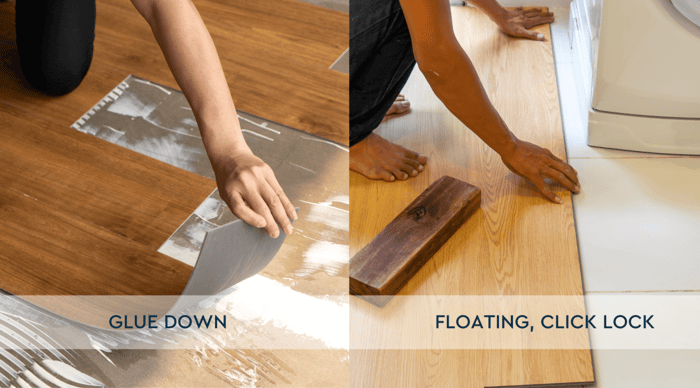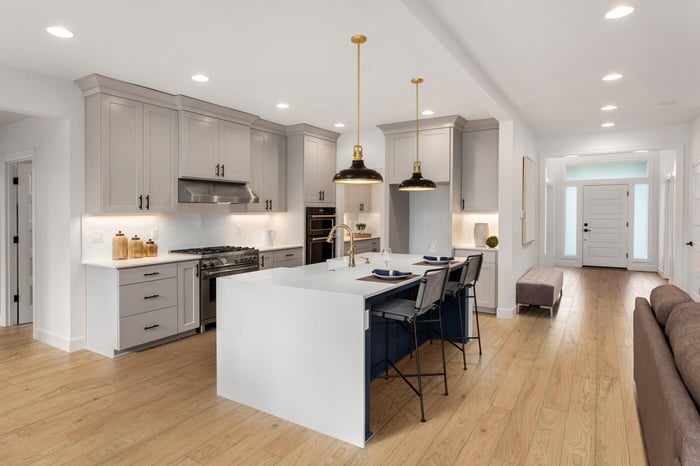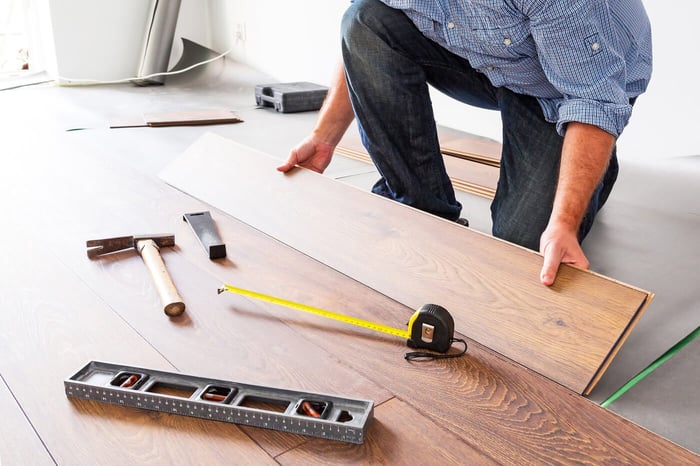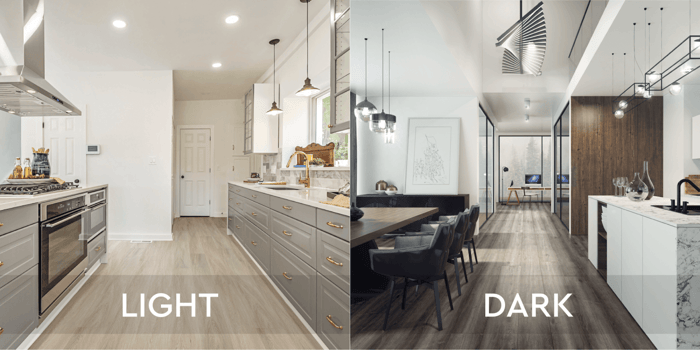
Glue Down versus Floating Click Lock Vinyl Floors
In the ever-evolving world of flooring options, vinyl has established itself as a versatile and durable choice. Two popular variations of vinyl flooring, glue down and click vinyl, have gained prominence in recent years.
Vinyl is highly resilient and can withstand heavy foot traffic, making it suitable for high-traffic areas in homes. Vinyl is waterproof, making it ideal for kitchens, bathrooms, and other areas prone to moisture. It's easy to clean and maintain, requiring only regular sweeping and occasional swiffer-ing. Vinyl floors come in a wide range of designs, including wood, tile, and stone patterns, allowing homeowners to achieve the look they desire. It offers a comfortable underfoot feel due to its cushioned layers, making it more pleasant to walk on compared to hard surface flooring materials.
Lastly, Vinyl Floors are often more affordable than hardwood, tile, or stone flooring, making it budget-friendly. Quality vinyl flooring can last for many years, providing a long-term flooring solution.
We're now going to dive into the differences between the two high level categories of vinyl flooring, Glue Down versus Floating (Click Lock) Vinyl Flooring.
Glue Down Vinyl Flooring
Installation: Glue down vinyl requires the use of adhesive to secure the planks or tiles directly to the subfloor. This process ensures a strong and stable bond.
Durability: Glue down vinyl is renowned for its durability, making it a preferred choice for high-traffic areas and commercial spaces.
Maintenance: Maintenance is relatively straightforward, but repairs can be challenging, as damaged pieces require adhesive removal for replacement.
Application: Glue down vinyl is ideal for high-traffic areas and commercial settings due to its durability and stability.
Click Lock / Floating Vinyl Flooring
Installation: Click vinyl utilizes a locking system that allows the planks or tiles to interlock without adhesive. It is a popular choice for DIY installations due to its ease of use.
Durability: While click vinyl flooring is known for its durability, it may not offer the same level of resilience as glue-down vinyl in handling rolling loads, such as motorized scooters and wheelchairs. As a result, click vinyl is often the preferred choice for residential use
Maintenance: Repairs are easier, as individual damaged planks or tiles can be replaced without extensive adhesive removal.
Application: Click lock, floating vinyl is well-suited for residential use, particularly in single-family homes. It provides a seamless appearance. Generally, click vinyl flooring offers more appealing visuals compared to glue- down vinyl, making it a more popular choice for residential use.
Trends in Single Family Homes
For single-family homes, the choice between glue down and click vinyl often hinges on factors like budget, installation skills, and aesthetic preferences. Click Lock Vinyl's DIY-friendly installation appeals to homeowners looking for a cost-effective and straightforward flooring solution.
Trends in Multi-Family Developments
In recent years, many multi-family builders have leaned toward glue down vinyl flooring. The preference for glue down over click and SPC (Stone Polymer Composite) vinyl can be attributed to concerns about installation quality and subfloor preparation. While click and SPC vinyl are excellent products when correctly installed, issues arise when rushed or subpar installations occur. These problems can lead to callbacks for repairs, resulting in additional costs and inconvenience.
Multi-family builders are recognizing that the perceived "bulletproof" nature of vinyl floors is contingent on proper subfloor preparation and installation techniques. To avoid potential issues, many builders are opting for glue down vinyl, which provides a reliable and time-tested installation method, reducing the likelihood of callbacks and repairs.
When deciding between glue down and click vinyl flooring, consider your specific needs, budget, and installation capabilities. In single-family homes, both options can be viable, with click vinyl offering an accessible DIY solution and glue down vinyl delivering commercial setting solution. In multi-family developments, the preference for glue down vinyl among builders is driven by the desire to minimize potential installation problems, speed of installation and ensure trouble-free flooring regardless of the type of traffic on the floor.
Ultimately, the success of any vinyl flooring project, whether in a single-family home or a multi-family development, depends on careful consideration of the product's suitability for the intended application, coupled with proper subfloor preparation and installation techniques.
Explore our best-selling, ready to ship Vinyl Floors today. Reach out to us at info@harperfloors.com or (888) 807-2704 to learn more about vinyl installation types and what works best for your specific project.



